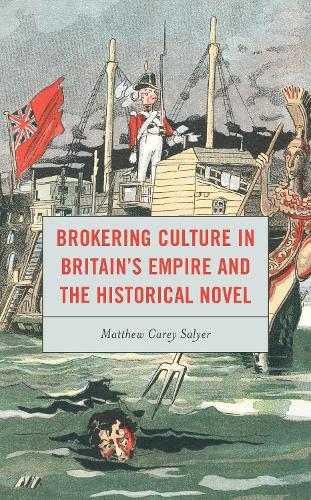
Brokering Culture in Britain's Empire and the Historical Novel
(Paperback)
Available Formats
Publishing Details
Brokering Culture in Britain's Empire and the Historical Novel
By (Author) Matthew C. Salyer
Bloomsbury Publishing PLC
Lexington Books
11th May 2022
United States
Classifications
Professional and Scholarly
Non Fiction
Politics and government
823.809
Physical Properties
Paperback
298
Width 152mm, Height 220mm, Spine 18mm
367g
Description
Brokering Culture in Britain's Empire and the Historical Novel examines the relationship between the historical sensibilities of nineteenth-century British and American romancers and the conceptual frameworks that eighteenth-century imperial interlocutors used to imagine and critique their own experiences of Britains diffused, tenuous, and often accidental authority. Salyer argues that this cultural experience, more than what Lukcs had in mind when he wrote of a mass historical consciousness after Napoleon, gave rise to the Romantic historiographical approach of writers such as Walter Scott, James Fenimore Cooper, Charles Brockden Brown and Frederick Marryat. This book traces the conversion of the eighteenth-century imperial speaker into the nineteenth-century romance hero through a number of proto-novelistic responses to the problem of Imperial history, including Edmund Burke in the Annual Register and the celebrated court case of James Annesley, among others. The author argues that popular Romantic novels such as Scotts Waverley and Coopers The Pioneers convert the problem of narrating the political geographies of eighteenth-century Empire into a discourse of history, placing the historical realities of negotiating Imperial authority at the heart of a nineteenth-century project that fictionalized the possibilities and limits of political historical agency in the modern nation state.
Reviews
In this intricate exploration of literature and history, Salyer (United States Military Academy, West Point) illuminates the way politics and imperialism infect 18th- and 19th-century texts. Whereas literature is often analyzed in terms of postcolonial history, Salyer suggests that history and historical accounts of imperial adventures correspond to and create literary forms in novels at the same time that novels invoke the imperial enterprise. . . Readers will appreciate how Salyer weaves the somewhat haphazard British consciousness of imperial changes with historical fiction and tales of empire to examine American and British writers and writing, such as James Fenimore Cooper, Sir Walter Scott, Charles Brockden Brown, Blackwoods Magazine, and Rudyard Kipling. Detailed and complex in argument, this critical text demands a careful academic reader. Those interested in how historical texts come to be mined for the historical-romance content of 19th-century novels will especially appreciate the work on Kiplings late empire perspective as a counterpoint to Frederick Marryats lived naval experience, captured in works like the The Phantom Ship (1839). Summing Up: Recommended. Graduate students, researchers, faculty.
* Choice *Brokering Culture is a provocative reimagining of eighteenth-century political and economic forces as they intersect with contradictory human factors in the haphazard and tragic founding of the [First] British Empire and the myths that cloak it. Salyer gives us a peek behind the curtain of romance and nationalism, where a cast of criminals, conmen, adventures, and outcasts are transformed into the heroes and villains of James Fenimore Cooper, Sir Walter Scott, and Rudyard Kipling. -- D. Michael Jones, East Tennessee State University
From Horace Walpole's broken windows at Strawberry Hill to far-flung reaches of the British empire, Matthew Salyer in Brokering Culture in Britain's Empire and the Historical Novel covers a vast expanse of historical and literary territory. As questions of "British" identity became complicated by the rapid expansion of empire in the 18th and 19th centuries, fiction became a space in which some of the tensions could be explored. In illuminating these tensions, Salyer impresses with his broad range and thoughtful selections, touring us through a fascinating array of literary texts and primary source material. Colorful anecdotes and personalities abound. Salyer's treatment of 18th- and 19th-century legal issues in a literary context makes a particularly distinctive contribution. This is an intelligent and captivating study. -- Steven P. Harthorn, University of Northwestern, St. Paul
Author Bio
Matthew Carey Salyer is associate professor of English at the United States Military Academy, West Point.
